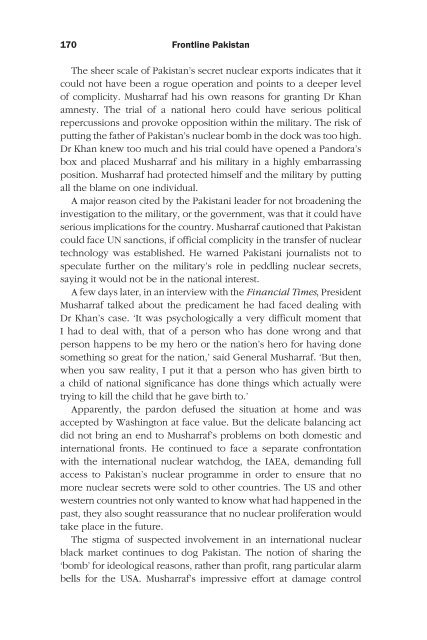Frontline Pakistan : The Struggle With Militant Islam - Arz-e-Pak
Frontline Pakistan : The Struggle With Militant Islam - Arz-e-Pak
Frontline Pakistan : The Struggle With Militant Islam - Arz-e-Pak
You also want an ePaper? Increase the reach of your titles
YUMPU automatically turns print PDFs into web optimized ePapers that Google loves.
1 0 <strong>Frontline</strong> <strong><strong>Pak</strong>istan</strong><br />
<strong>The</strong> sheer scale of <strong><strong>Pak</strong>istan</strong>’s secret nuclear exports indicates that it<br />
could not have been a rogue operation and points to a deeper level<br />
of complicity. Musharraf had his own reasons for granting Dr Khan<br />
amnesty. <strong>The</strong> trial of a national hero could have serious political<br />
repercussions and provoke opposition within the military. <strong>The</strong> risk of<br />
putting the father of <strong><strong>Pak</strong>istan</strong>’s nuclear bomb in the dock was too high.<br />
Dr Khan knew too much and his trial could have opened a Pandora’s<br />
box and placed Musharraf and his military in a highly embarrassing<br />
position. Musharraf had protected himself and the military by putting<br />
all the blame on one individual.<br />
A major reason cited by the <strong><strong>Pak</strong>istan</strong>i leader for not broadening the<br />
investigation to the military, or the government, was that it could have<br />
serious implications for the country. Musharraf cautioned that <strong><strong>Pak</strong>istan</strong><br />
could face UN sanctions, if official complicity in the transfer of nuclear<br />
technology was established. He warned <strong><strong>Pak</strong>istan</strong>i journalists not to<br />
speculate further on the military’s role in peddling nuclear secrets,<br />
saying it would not be in the national interest.<br />
A few days later, in an interview with the Financial Times, President<br />
Musharraf talked about the predicament he had faced dealing with<br />
Dr Khan’s case. ‘It was psychologically a very difficult moment that<br />
I had to deal with, that of a person who has done wrong and that<br />
person happens to be my hero or the nation’s hero for having done<br />
something so great for the nation,’ said General Musharraf. ‘But then,<br />
when you saw reality, I put it that a person who has given birth to<br />
a child of national significance has done things which actually were<br />
trying to kill the child that he gave birth to.’<br />
Apparently, the pardon defused the situation at home and was<br />
accepted by Washington at face value. But the delicate balancing act<br />
did not bring an end to Musharraf’s problems on both domestic and<br />
international fronts. He continued to face a separate confrontation<br />
with the international nuclear watchdog, the IAEA, demanding full<br />
access to <strong><strong>Pak</strong>istan</strong>’s nuclear programme in order to ensure that no<br />
more nuclear secrets were sold to other countries. <strong>The</strong> US and other<br />
western countries not only wanted to know what had happened in the<br />
past, they also sought reassurance that no nuclear proliferation would<br />
take place in the future.<br />
<strong>The</strong> stigma of suspected involvement in an international nuclear<br />
black market continues to dog <strong><strong>Pak</strong>istan</strong>. <strong>The</strong> notion of sharing the<br />
‘bomb’ for ideological reasons, rather than profit, rang particular alarm<br />
bells for the USA. Musharraf’s impressive effort at damage control













